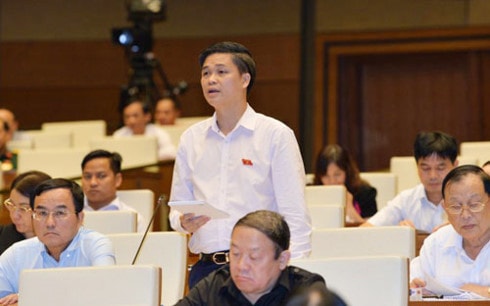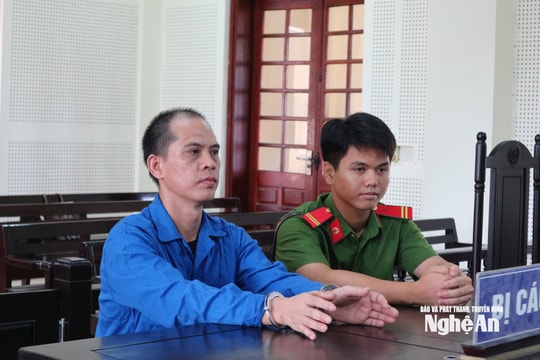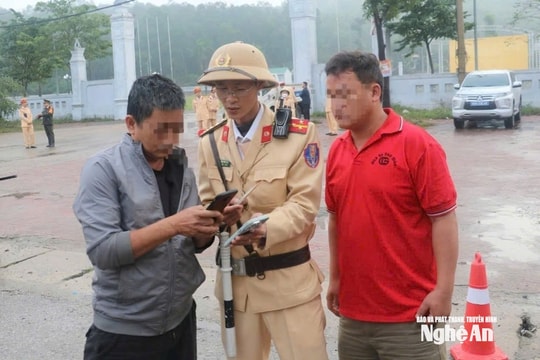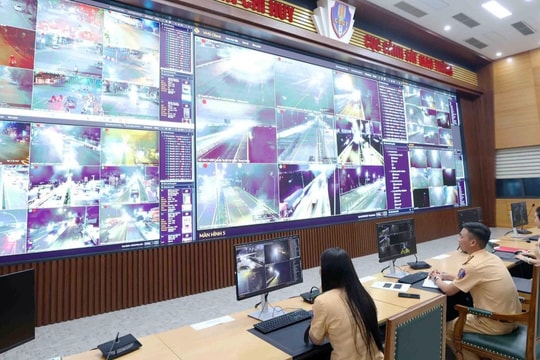'Officials who regularly dialogue with people can avoid bureaucracy'
According to Mr. Ngo Duy Hieu, officials who are close to the people and avoid bureaucracy must regularly dialogue and share with the people.
According to the assessment of the Central Citizen Reception Committee, in 2016, the number of complaints and denunciations sent to the Central Citizen Reception Office decreased but were still complicated, increasingly impulsive and had potential political elements. And usually, whenever the National Assembly meets, the number of people filing complaints and denunciations increases.
On this issue, VOV reporter interviewed Mr. Ngo Duy Hieu, Deputy Head of the National Assembly Delegation of Hanoi City.
 |
| Mr. Ngo Duy Hieu speaks at the National Assembly. Photo: Investment Newspaper |
PV:The recent monitoring results of the People's Aspirations Committee show that on average, provincial leaders only directly receive people 2-3 times a year, the rest of the time they delegate to their subordinates, while the regulation requires at least 1 day a month. In your opinion, why are leaders so reluctant to receive people?
Mr. Ngo Duy Hieu: In my opinion, there are four main reasons: some leaders at all levels have not fully recognized the role, meaning, and importance of receiving citizens and have not considered this a legal responsibility of theirs. Second: some other comrades are hesitant, even afraid, and do not dare to receive citizens. Because in reality, when receiving citizens, we have to listen and explain many things, but we must understand that this is our responsibility.
Third: the sanctions are unclear and the Law has not yet stipulated the rights of the people to request the leader to receive the people. Fourth: many comrades are busy with work and cannot arrange time, this may also be an objective reason but is related to the scientific nature of arranging working time and sense of responsibility.
PV: Even with the voters' petitions sent to the 2nd session of the 14th National Assembly, the agencies of the Ministry and the agencies at the ministerial level only responded generally, just to finish the job. How do you explain this?
Mr. Ngo Duy Hieu:Even the National Assembly delegation of Hanoi also informed voters of many responses from ministries and branches like that. After listening, voters still did not know where the problem was, when the results would be, who was responsible and what to do next? Some voters even stood up in the middle of the conference to protest the response.
Some agencies and leaders have not given strong instructions or made strict demands on the staff regarding the content, method, and quality of responses. Some ministries are afraid of responsibility, so they explain in a roundabout way, even recounting achievements. There are no specific sanctions, but this situation has continued for many years.
In my opinion, the National Assembly agencies and later the National Assembly delegations also have the right to request specific responses if the responses do not meet the requirements. And I suggest that the Ministries and branches also need to respond early so that the National Assembly delegations and National Assembly agencies can study and find that they are not suitable or do not meet the voters' requirements, then request again. Usually, when we respond close to the date of the voter contact, we do not have the opportunity to request more specific responses.
PV: The story of petitions being passed around from one level to another is still an endless one and people are still waiting wearily, even carrying kilograms of petitions. Why is that, sir?
Mr. Ngo Duy Hieu: In reality, there are many entities that receive citizens but are not at the same time the ones who resolve complaints and denunciations raised by citizens. Therefore, petitions are forwarded to competent authorities.
However, the fact that some agencies forward petitions in a roundabout way has both a sense of responsibility and a mentality of just passing them on. They also do not care who resolves the people's problems, how they resolve them, whether they are in accordance with the law, and whether they protect the people's rights and interests.
The issue is to urge and supervise to have the final result of the citizen reception. I think, in the coming time, there should be regulations, sanctions and legal constraints for the person receiving the citizen to pursue the matters that the citizen has reported and raised to them. This is a legal gap that we need to complete.
PV: There are many reasons why it is difficult to resolve people's complaints, including the shortcomings of the legal system. But what makes people dissatisfied is the responsibility of receiving citizens. Is this the reason that leads to mass complaints and tensions, sir?
Mr. Ngo Duy Hieu: Looking back at the cases of complaints and denunciations nationwide in recent times, we see that most of the cases are under the jurisdiction of the grassroots, district and commune levels. If they are resolved promptly and in accordance with the law right at the grassroots level, the problem will not reach the level of being sent to many central agencies, creating many mass complaints.
Among the reasons for the situation of agencies being promoted and promoted to higher levels, there are cases where grassroots officials avoid or do not resolve the issue properly from the beginning, including cases where they do not care to listen to or dialogue with people when new problems arise at the grassroots level.
When a new problem arises, it will be much simpler for us to approach, listen and resolve it. Although dialogue is defined, many places do not implement it, so the number of complaints is increasing. I think we need to return to the issue: officials should be close to the people, avoid bureaucracy and must regularly dialogue and share with the people.
PV:In your opinion, what factors determine the quality and effectiveness of citizen reception activities? Is there a mechanism to handle non-compliance with discipline and order in citizen reception?
Mr. Ngo Duy Hieu: First of all, the legal system, the conditions of facilities, the staff, the leaders responsible for receiving people as well as handling petitions of the authorities; legal awareness and the responsibility of citizens are the issues of concern. In which, the responsibility of the head of the agency is the overarching factor.
In fact, the determination of legal responsibility of individuals and agencies is currently limited. Therefore, to rectify discipline in receiving citizens, it is necessary to focus on two groups of subjects.
First of all, the group of heads of administrative agencies responsible for receiving people and the officials who receive people need to have sanctions to deal with them if they do not comply with the regulations, as well as the right of the people to sue in case they do not comply. Every year, in their year-end review, there should be a section on implementing the responsibility of receiving people. When considering the appointment and transfer of officials, this should be considered one of the criteria.
People also need to be educated and disciplined when they violate regulations to limit the situation of people coming to the reception area but shouting, vandalizing, and causing disorder.
PV: Thank you./.
According to VOV
| RELATED NEWS |
|---|




.jpg)



